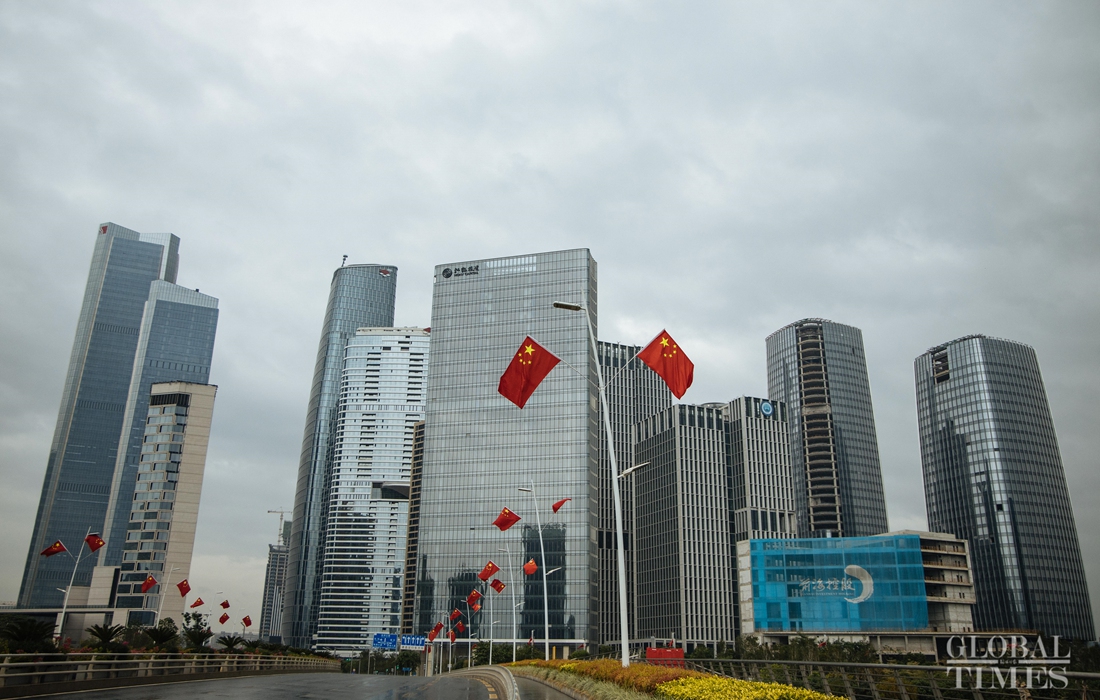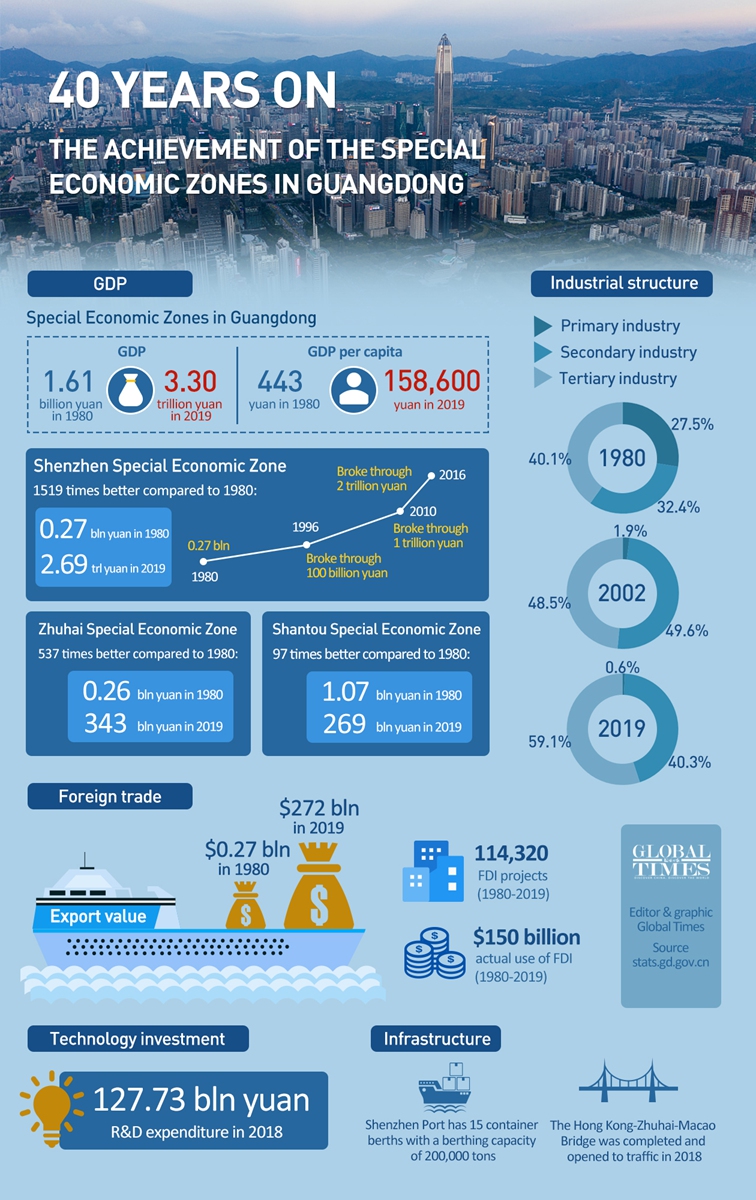Shenzhen granted new role in ‘one country, two systems’
By Li Xuanmin in Shenzhen, Chen Qingqing and Bai Yunyi in Beijing Source: Global Times Published: 2020/10/14 23:02:33 Last Updated: 2020/10/14 23:36:01
Xi outlines historic mission for China’s reform pioneer, helping HK to fix its own problems

Photo:Li Hao/GT
President Xi Jinping on Wednesday further elevated the role of Shenzhen, a pioneer of China's decades of reform and opening-up that lifted the country from poverty to global prominence, giving the city a historic mission to further implement the "one country, two systems" through integrated development with the Hong Kong and Macao special administrative regions.
In a speech to celebrate what he called a Shenzhen miracle, Xi said that Shenzhen is not only tasked to further lead the country's process of socialist modernization, but also to enrich the new practices of the "one country, two systems" cause.
Shenzhen's new role could also help Hong Kong, in particular, address its social and economic woes following unrest last year that threatened the city's stability and prosperity and challenges the "one country, two systems" principle, experts said.
The roles of the two neighboring cities - Shenzhen and Hong Kong - have profoundly changed over the years. Forty years ago, Hong Kong was a window for the Chinese mainland to learn from advanced technologies and modes of production in the Western world. But now, Shenzhen has become a pioneer and by being a forerunner in adopting China's path to modernity, it has outperformed its tutor.
When former Chinese leader Deng Xiaoping led reform and opening-up in the early 1980s in southern China, a series of policies was granted to cities like Shenzhen that allowed them to enjoy preferable tax rates and land policies. In the early stage of reform and opening-up, Hong Kong provided valuable technologies, funds and talents to the country's first Special Economic Zones (SEZ) to help local industries grow.
"The new mission bestowed upon on Shenzhen to allow it to play a bigger role in 'one country, two systems' is about expanding the scope of the principle. It means Hong Kong will be further integrated with the mainland through Shenzhen," Tam Yiu-chung, Hong Kong's delegate to the National People's Congress Standing Committee, told the Global Times on Wednesday.
Xi outlined Shenzhen's historic mission in the speech at the celebration of the 40th anniversary of the establishment of Shenzhen SEZ on Wednesday. The city should enrich the new practices of the "one country, two systems" cause, and lead the country's process of socialist modernization, Xi said.
Carrie Lam, chief executive of the Hong Kong SAR, was on stage with her two predecessors Tung Chee-hwa and Leung Chun-ying, on Wednesday when Xi delivered the speech.
"It's brand-new positioning of Shenzhen," Li Xiaobing, an expert on Hong Kong, Macao and Taiwan affairs at the Tianjin-based Nankai University, told the Global Times on Wednesday. When the practice of "one country, two systems" in Hong Kong faces obstacles given the social turmoil in 2019 and as the coronavirus outbreak has not been contained, traditional governance under "one country, two systems" needs to make breakthroughs and seek more room to solve the current problems, Li said.
In the past 40 years, Shenzhen has been growing partially with Hong Kong's resources, experience and channels.
"But when the US-led world system begins to fall into uncertainties and crisis, what should China do?" Li asked. After many years of exploration and accumulated experience, Shenzhen has given a new answer: "one country, two systems" must also be given a new definition, he said.

Infographic: GT
Bigger picture
Xi mentioned in the speech on Wednesday that more young people from Hong Kong and Macao should be attracted to study, work and live in the mainland through the platform of the Greater Bay Area, calling for wider exchanges and deeper integration among young people in Guangdong, Hong Kong and Macao to strengthen their sense of belonging to the motherland.
Hong Kong needs to work with Shenzhen to further integrate into the country's overall planning in the future, which will also help the city fix its own problems in economic and social development, and particularly curb the emerging secessionism among young Hong Kong people, Lau Siu-kai, vice-president of the Chinese Association of Hong Kong and Macao Studies, told the Global Times.
Ahead of the celebration on Wednesday, authorities in Shenzhen released a list recognizing 40 people for their contribution to Shenzhen's rapid development, among whom three are from Hong Kong. The three are from the education, high-technology and transport and infrastructure sector, which clearly underlines the key areas in which the two cities have been working together, some observers said.
While some Hong Kong schools send students to the Chinese mainland for summer camps, Tam, who is also one of the city's top lawmakers, told the Global Times more colleges in Hong Kong are encouraged to open branch campuses in the Greater Bay Area, and foreign schools are also welcome to the region. "In education, Hong Kong can also offer its experience to Shenzhen," he said.
According to the recently unveiled document which details measures to support Shenzhen in building a pilot demonstration area of socialism with Chinese characteristics, central authorities granted the city much more autonomy in land management, talent, capital, market access, data use platform and legislation. Observers believe that this means Shenzhen now has much a greater autonomy in areas that include land use and foreign investment in the tech sector, and the level of autonomy in carrying out reforms in key areas is even higher than that in municipalities like Shanghai and Chongqing.
"Granting Shenzhen more autonomy means the city will be much more open to Hong Kong, which is also the practice of a new system in order to help Hong Kong take part in Shenzhen's development," Tam said.
Solve HK problems
Many Hong Kong businesspeople have already adopted a "twin-city" strategy, moving some research and development (R&D) as well as production to Shenzhen to take advantage of the city's complete industrial chain and proximity to a 1.4-billion mainland consumer market.
"Shenzhen's development will help alleviate Hong Kong's employment pressure and social conflicts," Kris Tsang, founder of the Shenzhen-based 708090 Co-working Space, told the Global Times on Wednesday. He urged Hong Kong's young generation to seize the "golden opportunity" of the Greater Bay Area platform and fully utilize their talents and advantages to participate in the area's construction.
During the social unrest in Hong Kong in 2019, gaps in the housing and job markets have become major woes for the young generation and wealth inequality is widely seen as the economic root of anti-government protests that descended into chaos and violence.
While some Western media hyped Wednesday's event as indicating a further weakening of the status of Hong Kong in favor of raising the leverage of Shenzhen in the central government's policymaking, some observers see it as a misunderstanding.
"The key to solving the problems that Hong Kong faces today lies not in the central government, but in itself," Lau said.
Faced with significant changes in the geopolitical environment in which the US government has been pressuring the Chinese government by using Hong Kong as leverage, the only way out is that Hong Kong reduces its reliance on the West and further integrates with the mainland, he noted.
Posted in: POLITICS